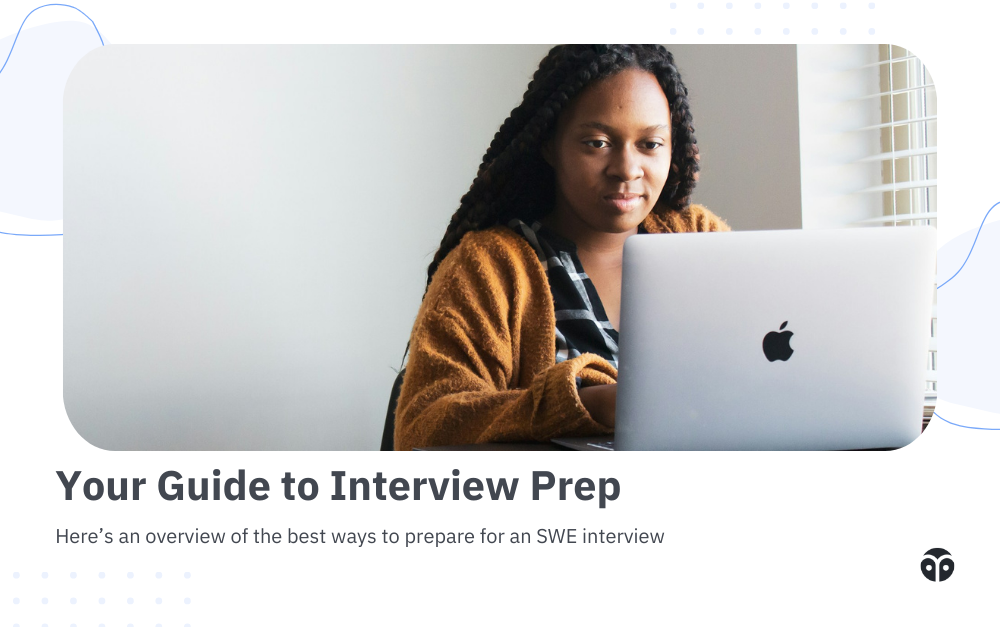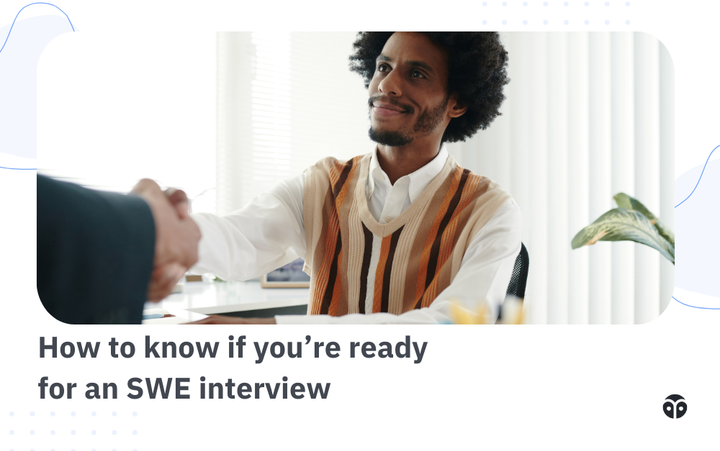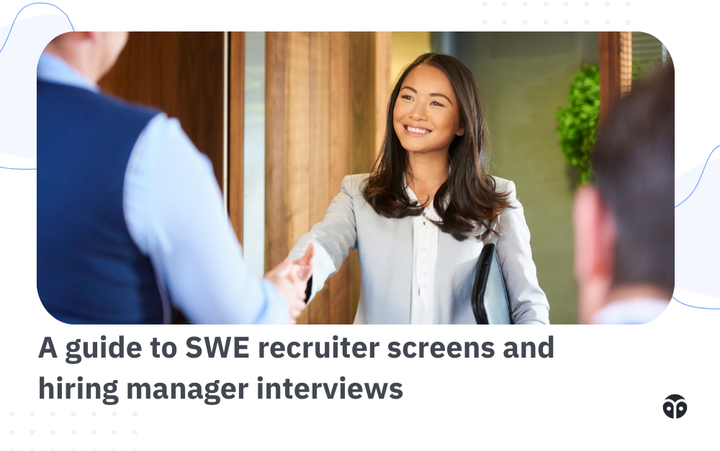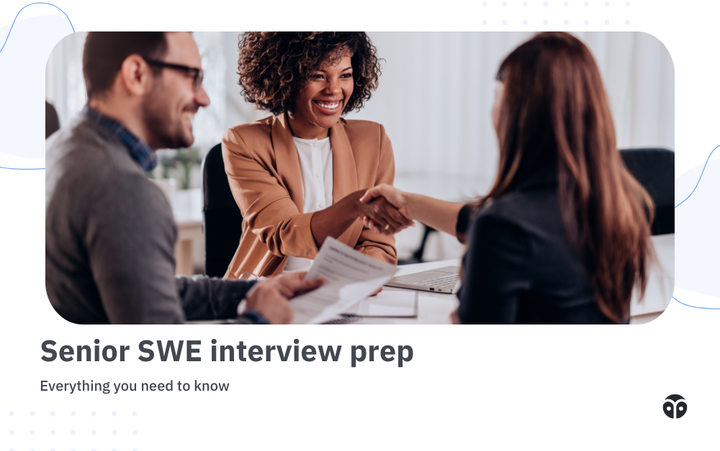How to prepare for a software engineer interview
Your complete guide to preparing for software engineer interviews.

With multiple interview loops and a variety of coding challenges, making sure you’re ready to interview can feel like a full-time job. And it’s not easy to know where to start. The software engineering interview process typically consists of several stages, each designed to assess different skills and attributes.
Here's a breakdown of what to expect:
- Phone screen. A recruiter or engineer will set up an initial call to ask about your background, projects, and technical skills. You might face some basic coding questions to gauge your problem-solving abilities.
- Technical interviews. This stage involves solving coding problems. These tests often evaluate your knowledge of algorithms and data structures.
- On-Site interviews. If you pass the technical assessment, you'll be invited to on-site interviews. These usually include multiple rounds of coding challenges, system design questions, and behavioral interviews.
- Behavioral interviews. These assess how well you work in teams, handle challenges, and fit with the company culture. Expect questions about past experiences and how you've handled various situations.
Here’s how to get started prepping for every stage of the interview process.
Make sure your foundation is solid
A solid grasp of fundamental computer science concepts is non-negotiable. Try making coding practice a daily habit. Even short, focused sessions can lead to significant improvements over time.
One popular place to practice coding problems is LeetCode, but there are plenty of LeetCode alternatives you can try, too! These platforms offer many different kinds of problems categorized by difficulty and topic. They provide community solutions and discussions to help you understand different approaches. While you get ready for a software engineer interview, identify your weak points and dedicate extra time to them.
Make sure you review data structures and algorithms and familiarize yourself with basic database concepts, including SQL queries, normalization, and indexing.
Simulate interview conditions by solving problems within a time limit to improve your speed and accuracy under pressure. After solving a problem, review your solution and compare it with others to understand different methods and optimize your approach. It’s important to practice communicating your code—sometimes it’s easy to get caught up in practicing the speed of coding when communicating your code is just as (if not more) important in interview settings.
Have a working knowledge of system design
The goal of the system design interview boils down to finding out if you are able to explain your ideas clearly and document them. You should convey to the interviewer that you can create concrete technical requirements for an ambiguous problem, give a high level description of how to implement them, and show you can defend your design and explain your reasoning.
To prepare, make sure you
- Know the fundamentals. Familiarize yourself with core system design principles such as scalability, load balancing, caching, data partitioning, and consistency. Know the trade-offs involved in different design choices.
- Study real-world systems. Analyze the architecture of large-scale systems like Facebook, Twitter, and Google. Understand how they handle millions of users, high availability, and fault tolerance.
- Practice designing systems. Regularly practice designing systems from scratch. Common scenarios include designing a URL-shortening service, a social media feed, or an e-commerce platform. Focus on the components, data flow, and interactions.
- Practice communicating your ideas. Engage in mock interviews with peers or mentors. Discussing your designs and receiving feedback helps you refine your approach and improve your ability to communicate your ideas clearly.
Don’t skimp on behavioral interview prep
Behavioral interviews evaluate your past experiences, problem-solving abilities, teamwork, and leadership skills. Companies use them to predict your future behavior based on past actions. Most of the time, people think there’s not a lot of prep work to do for them. That’s a myth!
Don’t get caught unprepared. Make sure you familiarize yourself with common behavioral questions, such as "Tell me about a time you faced a challenge at work," "Describe a situation where you had to work as part of a team," and "Tell me about yourself."
When you’ve thought about your answers, practice your responses:
- Structure your answers using the STARR method (Situation, Task, Action, Result, Reflection).
- Think of several key experiences from your past roles that highlight your skills and achievements and use them to pitch yourself. Focus on instances where you demonstrated problem-solving, leadership, teamwork, and adaptability.
- Practice your responses out loud, either alone or with a friend. This will help you become more comfortable with your stories and improve your ability to deliver them naturally during the interview.
Participate in mock interviews
Mock interviews simulate real interview conditions, helping you get comfortable with the format, timing, and pressure of actual interviews. They allow you to identify areas for improvement in a low-stakes environment.
There are several ways to set up mock interviews. You can practice with friends or colleagues, join coding meetups, or use online platforms for interview coaching, which connect you with experienced engineers for practice sessions. Formation offers unlimited mock interviews and career coaching for software engineers. Participants have access to unconditional support from a team of hundreds of FAANG-level engineering mentors, technical recruiters, career coaches, and more.
Keep going and ask for help
The job hunt can be overwhelming, especially given the current state of the tech job market. Good preparation and dedication to finding the right fit for you will get you far. It also helps to have a community of people to lean on—Formation’s mentors come from some of the best tech companies in the world, and the personalized career coaching and supportive community make for a great support system. If you’re having trouble navigating your job search on your own, apply here and get unconditional support from a team of engineering mentors, technical recruiters, career coaches, and more.
Stay persistent, keep learning, and remain confident in your abilities. With thorough preparation, you'll be well-equipped to tackle any challenge and secure your desired role in the tech industry. Good luck!



